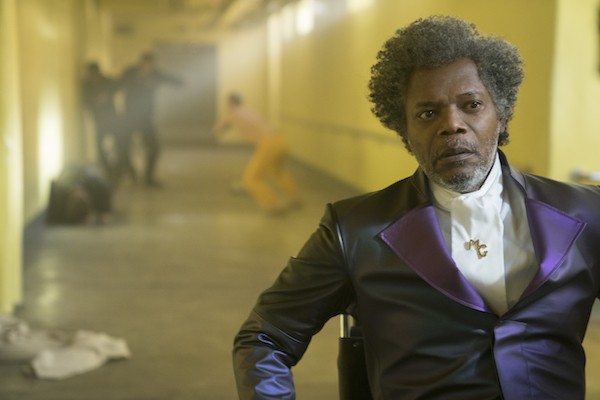
Forget about trying to ascertain whether Glass (*1/2 out of four) is a theatrical experience that should be viewed as either half-full or half-empty. Instead, the latest headache-inducer from writer-director M. Night Shyamalan is such a parched project that viewers will leave the auditorium with the irritable sensation that there’s sand trapped in their shorts … or possibly in their heads.
Certainly, a scorched-earth approach has been taken by Shyamalan when it comes to penning this contrived and condescending nonsense. It’s the third part of the trilogy that began with 2000’s Unbreakable, the auteur’s first film following The Sixth Sense and an interesting achievement that functioned as a comic-book movie but also operated well outside the genre’s established parameters. I’m dubious that Shyamalan really intended to make a trilogy all along; the feeling from watching 2017’s insufferable Split was that it was a self-contained story to which he added (more like forced) a last-second twist to ensnare impressionable moviegoers. Both thematically and stylistically, Unbreakable and Split were about as compatible as oil and vinegar, or drinking and driving, or Pelosi and Trump — nevertheless, enough people bit hard enough that we now have Glass, which brings together the characters from the previous two films in a rank gumbo that grows progressively worse as it ambles along.
Split star James McAvoy returns as Kevin Wendell Crumb, the psychopath in possession of 24 distinct personalities (never mind that Split botched mental illness so badly that scores of experts objected; that’s another story); Unbreakable star and Split cameo player Bruce Willis is back as the heroic — make that superheroic — David Dunn; and Unbreakable co-star Samuel L. Jackson reenters the scene as the villainous — make that supervillainous — Mr. Glass. All three find themselves confined to a mental institution wherein Dr. Ellie Staple (Sarah Paulson) tries to analyze them while Kevin teases the staffers, Glass plots his next master plan, and David pouts a lot.
While I’m sure to see worse movies than Glass over the rest of 2019, there’s no guarantee I’ll see any as pretentious and self-important as this one. The majority of the picture is merely average and thus innocuous, marked by the sort of obvious developments, stagnant set-pieces and unremarkable dialogue we’ve come to expect from most M. Night endeavors. There’s also the curious sight of the filmmaker simultaneously trying to suck up to comic-book aficionados even as he’s trying to conceal his disdain for their kind; at any rate, his approach suggests that he hasn’t even held an actual comic book in his hand in 19 years (i.e. since Unbreakable), let alone taken the time to flip through one.
It’s when Glass reaches the third act that it completely falls apart. The final showdown is not only anti-climactic (as much as anything could have been climactic in a snoozer such as this) but represents some of the worst directing and the worst writing in Shyamalan’s career, with the spatial relationships poorly staged and the timing of events ultimately feeling as prolonged as any fond farewell between Hobbits. Of course, it wouldn’t be an M. Night Shyamalan Special Event if there weren’t some sort of twist ending, but the one here is especially ludicrous. Not to engage in spoilers, but anyone who remembers the laughable sequence in Signs when Mel Gibson and Joaquin Phoenix spot an alien on TV — as well as the reason that the scene was so risible — can rest assured that the big reveal here operates in similarly stupid fashion.
The only positive attribute of Split resided in the performance by McAvoy, whose dark turn at least felt of a piece with the picture’s overarching grimness. Stripped of the surrounding darkness of that magnitude, McAvoy’s emoting this time around feels more hammy, more akin to watching Eddie Murphy don the disguises in such low-rent efforts as Norbit and Nutty Professor II: The Klumps. Willis, on the other hand, plays it close to the vest — so close, in fact, that you wish the movie would end just so the actor can return to his nap. As for Jackson, he’s engaging to watch, although, like everyone else, he’s less of a vibrant individual and more of a chess piece for Shyamalan to shove across the playing field.
Glass is a misfire, a muddle, and a missed opportunity, but mostly it’s just a vessel for shattered expectations.
